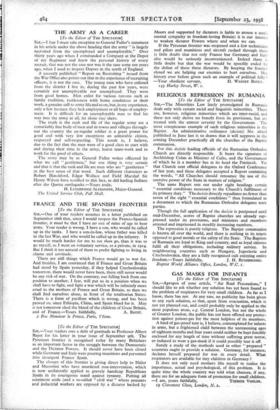THE ARMY AS A CAREER
[To the Editor of THE SPECTATOR] SIR,—I fear I must take exception to General Fuller's statement in his article under the above heading that the army " is largely recruited from the unemployed and unemployable." Over thirty years ago when I commanded a Company at the Depot of my Regiment and knew the personal history of every recruit, that was not the case nor was it the case some ten years ago, when I used to inspect Depots in the north of England.
A recently published " Report on Recruiting " issued from the War Office also points out that in the experience of recruiting officers, it is not the case. The young men who have enlisted from the district I live in, during the past few years, were certainly not unemployable nor unemployed. They were from good homes. Men enlist for various reasons such as family tradition, restlessness with home conditions or their work, a genuine call to army life and soon, but, in my experience, only a few because they lack employment or all hope of employ- ment. It is difficult for an unemployable man to find his way into the army at all, let alone stay there.
The truth is the rank and file of the regular army are a remarkably fine body of men and in towns and villages through- out the country the ex-regular soldier is a great power for good and with very few exceptions an admirable citizen, respected and self-respecting. This result is, I believe, due to the fact that the men were of a good class to start with and during their time in the army, learnt team-work and to work for the good of others.
The army may be as General Fuller writes officered by what we call " gentlemen," but one thing is very certain and that is that the rank and file are men who are " gentkmen " in the best sense of that word. Such different characters as Robert Blatchford, Edgar Wallace and Field Marshal Sir Henry Wilson have testified to this fact, as did leading Indians after the Quetta earthquake.—Yours „truly,






































 Previous page
Previous page